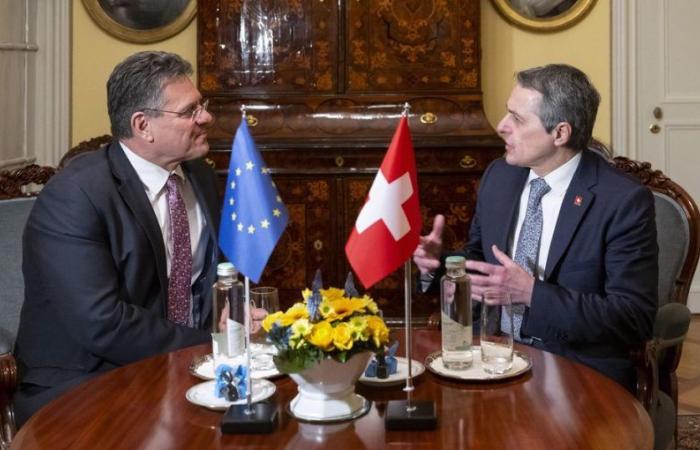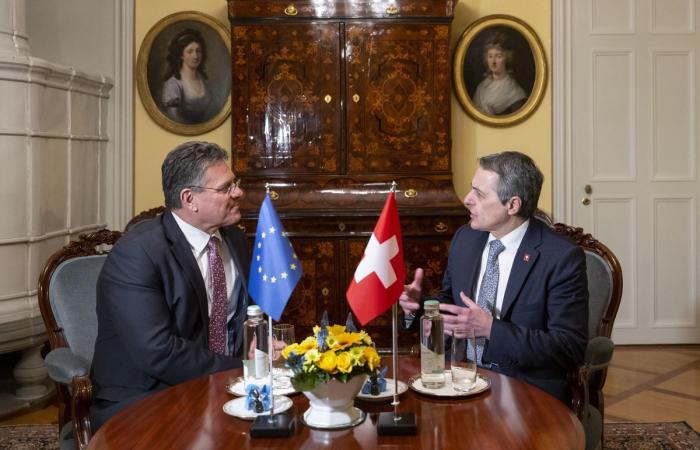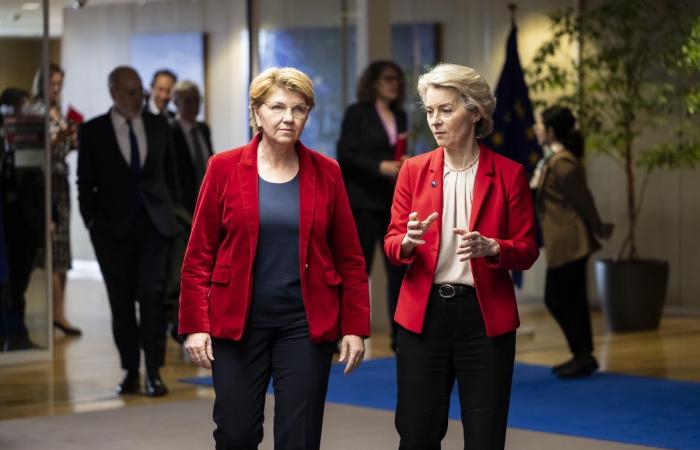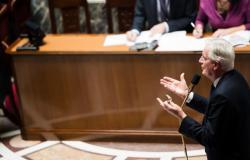– Negotiations could be concluded by the end of the year
Switzerland is asking the EU for a safeguard clause relating to free movement. Brussels, supported by member states, firmly rejects it and puts pressure on it.
Published today at 3:43 p.m.
Maros Sefcovic, Vice-President of the European Commission, during a visit to Bern with Federal Councilor Ignazio Cassis.
PETER SCHNEIDER/KEYSTONE
Subscribe now and enjoy the audio playback feature.
BotTalk
- The EU wants to conclude negotiations with Switzerland quickly.
- She is opposed to a safeguard clause concerning the free movement of people.
- Brussels wants to use Swiss participation in European programs as leverage.
- Existing agreements will be updated and new ones concluded in the electricity and food security sectors.
Maros Sefcovic made a very clear announcement. Negotiations with Switzerland must be concluded by the end of the year, without the safeguard clause wanted by Switzerland in terms of free movement of people. The Vice-President of the European Commission and opponent of Federal Councilor Ignazio Cassis will brief the representatives of the Member States to this effect, as he has already made known in advance.
According to Ursula von der Leyen’s deputy, a conclusion is expected by December given the momentum and progress made so far. A detailed agreement, the results of which were co-signed in a technical document by the delegations, the “common understanding”, had been concluded. The EU has already shown itself to be flexible when it comes to the free movement of people and has granted Switzerland exceptions. Ursula von der Leyen sent an unequivocal message to the highest political level. “An escape clause is not acceptable.”
Fight against discrimination
Brussels will not address the free movement of people in the absence of an agreement. Commissioner Maros Sefcovic will not have to do much persuasion work within the Member States. European affairs ministers and state secretaries will clearly support the European Commission’s line. This is what emerged from the exploratory discussions at the level of the permanent representatives of the Member States. They take turns insisting on the joint declaration agreed with Switzerland at the end of these preparatory stages, even before the start of negotiations. Several ambassadors pointed out that a unilateral escape clause did not fall within the scope of “common understanding“. Some Member States further call on the Commission to apply the principle of non-discrimination regarding the free movement of people. Concretely, this involves allowing citizens of the new EU member states to obtain a permanent residence permit in Switzerland after five years.
On certain points, negotiations are already well advanced, for example on so-called institutional questions, with the role of the European Court of Justice as arbiter of last resort and the “dynamic” takeover of EU law by Switzerland. Regarding public aid, Switzerland is required to respect rules equivalent to those of the EU, under the supervision of an independent authority. As for energy, according to the Commission, it is prepared to adopt decisive measures in the European electricity market. Points remain open, whether on the skills of regulators and existing subsidies in Switzerland.
The financial contribution to EU cohesion as a point of contention
It was also agreed that Switzerland would pay its contribution to cohesion and stability in Europe in a regular and unfailing manner in the future, mainly to support the common market economy. This request was also made by the new Eastern European member states during preliminary discussions. The European Commission regrets that Switzerland has not yet set the amount of its contribution. According to internal documents, the Federal Council would like to reserve this question for the last round of the table. Conversely, the European Commission is slowing down Switzerland’s participation in European programs such as research.
Brussels also wants to use Horizon Europe, a program for research and innovation, as leverage in the final sprint of the negotiations. As well as Switzerland’s interest in agreements in the food security, electricity and health sectors. Bern also has an interest in being able to take over European rights in the field of air traffic. This is an additional lever to assert the interests of the EU. The objective is to obtain a pack more balanced overall. Conversely, Europe wants to ensure that Switzerland authorizes international rail connections on its tracks, and not just in theory.
A global package or nothing
Most member states insist that the package approach is maintained, even with the new agreements, and not that electricity is excluded. Maros Sefcovic would like to make Member States understand that there is urgency. Switzerland, for its part, is in no hurry and sees no need to adapt. However, the political climate risks deteriorating in the run-up to the vote on the popular initiative “for environmental responsibility”.
Brussels hopes that things will move again before November 6 and that the Federal Council will then draw up an interim assessment. The European Commission is counting on chief negotiator and deputy state secretary and head of the FDFA’s Europe Division, Patric Franzen, to obtain approval for the latest compromises. So, we could actually see things more clearly by the end of the year.
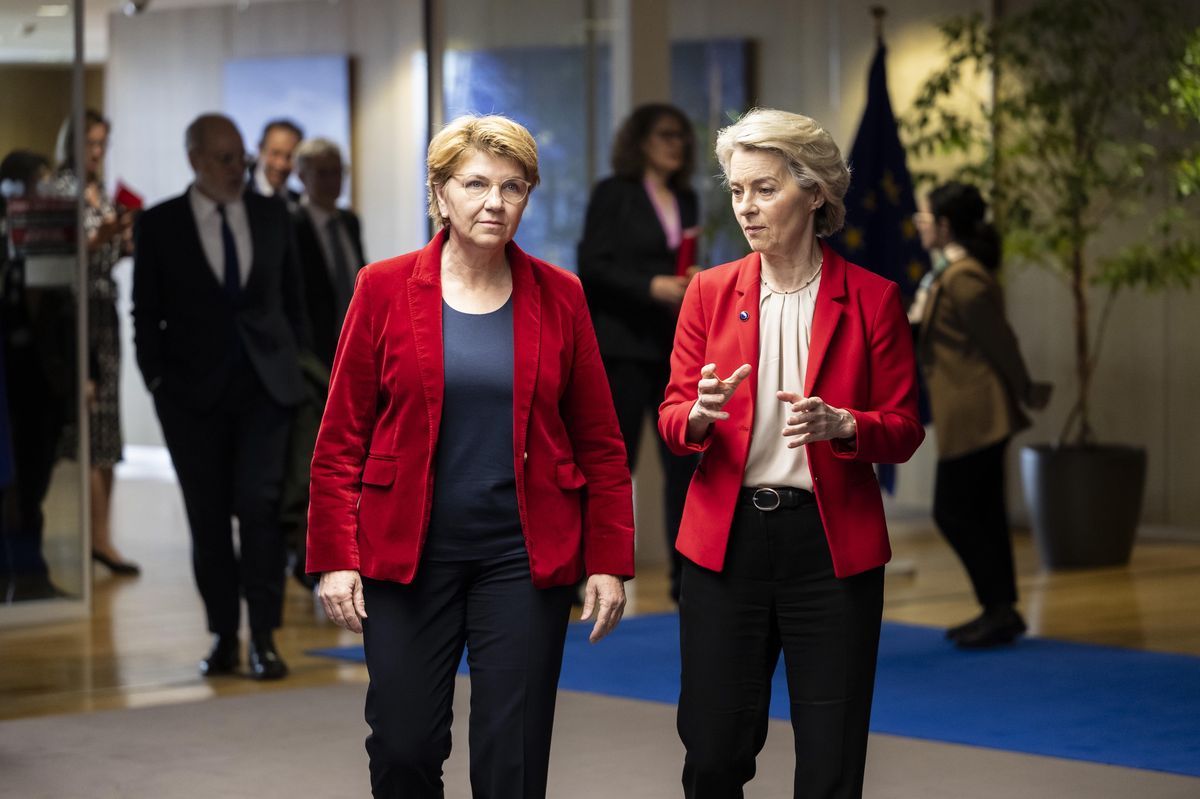
The President of the Confederation, Viola Amherd, with Ursula von der Leyen at the launch of negotiations last March.
ALESSANDRO DELLA VALLE/KEYSTONE
“Latest news”
Want to stay on top of the news? “24 Heures” offers you two appointments per day, directly in your email box. So you don’t miss anything that’s happening in your Canton, in Switzerland or around the world.
Other newsletters
Log in
Did you find an error? Please report it to us.
3 comments

